A TRIP ON THE PANAMA RAILROAD.
Panama in 1855. An Account of the Panama Railroad;
of the Cities of Panama and Aspinwall;
with Sketches of Life and Character on the Isthmus. By Robert
Tomes. Harper and Brothers.
"WOULD you like to go to Panama?" was the question
propounded to one of our esteemed contributors. The track of the
Panama Railroad had been completed from ocean to ocean, and the
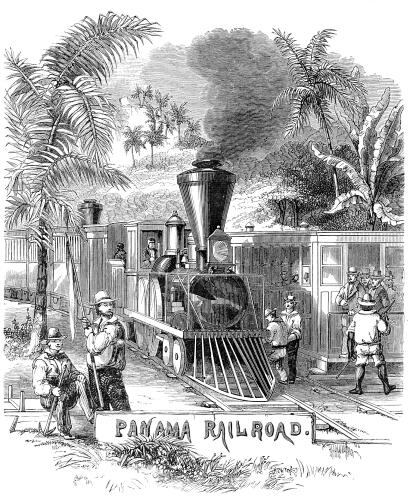 Company that had for five years been so lavishly
casting its dollars upon the fever-haunted Isthmus, in the confident
hope of finding them again, with increase, after many days, had
resolved to give a grand celebration with wining and dining and
speechifying, in honor of the event. Company that had for five years been so lavishly
casting its dollars upon the fever-haunted Isthmus, in the confident
hope of finding them again, with increase, after many days, had
resolved to give a grand celebration with wining and dining and
speechifying, in honor of the event.
It was January, and the thermometer stood at zero in New York,
and mortal man could not be expected to resist the temptation
to visit the tropics free of expense. So our friend returned an
answer of acceptance to the formal note inviting him to assist
in commemorating the important event, and instituted a search
into the receptacles which contained last year's summer wardrobe,
in preparation for the trip.
On the 5th of February the good steamer George Law left
the wharf at New York, bearing, in addition to its usual miscellaneous
crowd of Californian emigrants, the company of invited guests,
and the United States Minister to Granada. A "Notice"
to passengers, conspicuously posted up, intimating that no deadly
weapons were to be worn on board, and no fire-arms discharged,
and that it was out of order for any person to make his appearance
at the dinner-table with his coat off, might have been a little
startling to the nerves of a timorous or fastidious person; while
the ostentatious display of life-preservers" hinted at the
possibility of drowning too plainly to be altogether agreeable
to one who was not insured against that mode of leaving the world,
by a premonition that he was reserved for a certain other fashion
of exit.
Nobody, however, was shot, stabbed, or drowned, and the brave
vessel, passing within sight of the green hills of Cuba and Hayti,
and the Blue Mountains of Jamaica, dashed with never-resting wheels
among the islands of the Caribbean Sea, and at length, on the
eleventh day, lay motionless as a captured whale, at the dock
at Aspinwall, the Atlantic terminus of the Panama Railway.
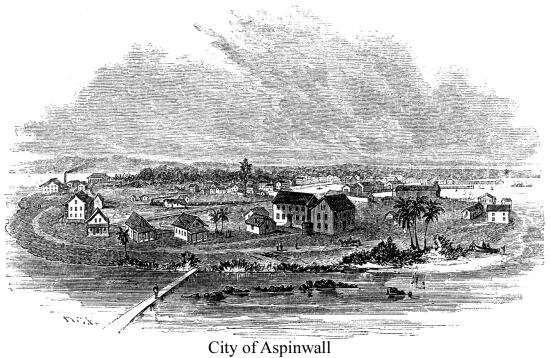 If the map proudly displayed by the enthusiastic
draughtsman of the Company is to be accepted as prophetic, Aspinwall
is destined to be a wonderful city. Broad avenues—A, B, C,
and so on far down the alphabet—are intersected by streets,
to designate which whole squadrons of Roman numerals are pressed
into service. Magnificent docks give proof that the interests
of commerce are to be duly cared for; while the noble Boulevard
surrounding the city, as the "ocean strewn" girdled
the shield of Achilles, and a spacious "Central Park,"
show that devotion to the "Almighty Dollar," the tutelar
genius of America; was not the sole passion in the hearts of the
projectors. If the map proudly displayed by the enthusiastic
draughtsman of the Company is to be accepted as prophetic, Aspinwall
is destined to be a wonderful city. Broad avenues—A, B, C,
and so on far down the alphabet—are intersected by streets,
to designate which whole squadrons of Roman numerals are pressed
into service. Magnificent docks give proof that the interests
of commerce are to be duly cared for; while the noble Boulevard
surrounding the city, as the "ocean strewn" girdled
the shield of Achilles, and a spacious "Central Park,"
show that devotion to the "Almighty Dollar," the tutelar
genius of America; was not the sole passion in the hearts of the
projectors.
It must be confessed that the real Aspinwall hardly corresponds
with the ideal existing in the mind of the enthusiastic artist,
as our friend the Doctor—for we may as well give him his
official title—discovered when he set out on a tour of exploration.
"A hundred or so," he says, "are about the whole
number of houses in Aspinwall. Upon the beach at the northern
end of the island are a few scattered buildings, gay with white
paint and green blinds, chiefly occupied by the officials of the
Panama Railroad, while to the right of these are the works and
depot of the company with machine shops and reservoirs. The shore
at the north curves round, leading easterly to an uncleared portion
of the island, where a narrow rim of white beach separates the
sea from the impenetrable jungle. As we turn westerly and follow
the shore, taking the Mess House as the point of departure, we
come upon a building of corrugated iron in progress of erection,
intended for the residence of the British Consul, if he will ever
have the courage to live in what is only a great target for all
the artillery of heaven. The lightning during the rainy season
keeps it in a continual blaze of illumination, and I mourned,
in common with Colonel Totten, whose house is next door, over
several prostrate cocoa-nut palms, which had been struck down
in consequence of their fatal propinquity to the iron-house. As
we proceed we pass three wooden, peaked-roofed cottages, with
green blinds and verandas, inhabited by employees of the Company;
hurry past some ugly whitewashed buildings, which the palefaced
sailor and the melancholy convalescent negro, sitting smoking
their pipes on the steps, remind us are hospitals, and soon passing
by some outlying hats with half naked negresses and pot-bellied
children sunning themselves in front, we make our way into the
thicker part of the settlement over marshy pools corrupt with
decaying matter, black rotten roots of trees, and all kinds of
putrefying offal, which resist even the street-cleaning capacities
of those famous black scavengers, the turkey-buzzards, which gather
in flocks about it. We now get upon the railroad track, which
leads us into the main street. A meagre row of houses facing the
water, made up of the railroad office, a store or two, some half
dozen lodging and drinking establishments, and the `Lone Star,'
bounds the so-called street on one side, and the railroad track,
upon its embankment of a few feet above the level of the shore,
bounds the other.
"There is another and only one other street, which you
reach by crossing a wooden bridge, that a sober man can only safely
traverse by dint of deliberate care in the daytime, and a drunken
man never, and which stretches over a large sheet of water that
ebbs and flows in the very centre of the so-called city. This
second street begins at the coral beach at the northern end of
the island, and runs southward until it terminates in a swamp.
At the two extremities houses bound it on both sides; in the middle
there is a narrow pathway over an insecure footbridge, with some
tumble-down pine buildings on one side only, with their foundations
soaking in the swamp, their back windows inhaling the malaria
from the manzanilla jungle in the rear, and their front ones opening
upon the dirty water, which we have already described, that fills
up the central part of the city. The hotels—great, straggling,
wooden houses—gape here with their wide open doors, and catch
California travelers, who are sent away with a fever as a memento
of the place, and shops, groggeries, billiard-rooms, and drinking
saloons thrust out their flaring signs to entice the passer-by.
All the houses in Aspinwall are wooden, with the exception of
the stuccoed Railroad office, the British Consul's precarious
corrugated iron dwelling, and a brick building in the course of
erection under the slow hands of some Jamaica negro masons. The
more pretentious of the wooden buildings were sent out from Maine
or Georgia bodily.
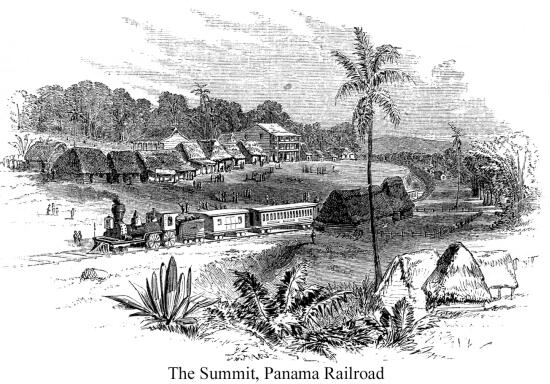 "The inhabitants of Aspinwall—some
eight hundred in number—are of every variety of race and
shade in color. The railroad officials, steamboat agents, foreign
consuls, and a score of Yankee traders, hotel-keepers, billiard
markers, and bar-tenders, comprise all the whites, who are the
exclusive few. The better class of shop-keepers are mulattoes
from Jamaica, St. Domingo, and the other West Indian Islands,
while the dispensers of cheap grog, and hucksters of fruit and
small wares are chiefly negroes. The main body of the population
is made up of laborers, grinning coal-black negroes from Jamaica,
yellow natives of mixed African and Indian blood, and sad, sedate,
turbaned Hindoos, the poor exiled Coolies from the Ganges." "The inhabitants of Aspinwall—some
eight hundred in number—are of every variety of race and
shade in color. The railroad officials, steamboat agents, foreign
consuls, and a score of Yankee traders, hotel-keepers, billiard
markers, and bar-tenders, comprise all the whites, who are the
exclusive few. The better class of shop-keepers are mulattoes
from Jamaica, St. Domingo, and the other West Indian Islands,
while the dispensers of cheap grog, and hucksters of fruit and
small wares are chiefly negroes. The main body of the population
is made up of laborers, grinning coal-black negroes from Jamaica,
yellow natives of mixed African and Indian blood, and sad, sedate,
turbaned Hindoos, the poor exiled Coolies from the Ganges."
Notwithstanding the profuse hospitality of his hosts, with
Champagne cocktails and choice Havanas ad libitum, the
Doctor could not find it in his heart to be grieved at the announcement
that the grand expedition across the Isthmus was about to be made.
In addition to its own habitual fever, Aspinwall was in a fever
of excitement in anticipation of the great event. Speeches and
counter-speeches were to be delivered, and duly reported for the
New York Press. Those who expected to be "most unexpectedly
called upon to fill a gap," showed a praiseworthy diligence
in preparing the materials, and in rehearsing their speeches to
each other, so as to provide against any possibility of failure.
The appointed hour at length came and the train left the depot,
amidst a general waving of the star-spangled banner from the shipping,
and a display of miniature copies of the same from the hotels
and drinking saloons while from the balcony of the "Lone
Star" a. single white female waved her white handkerchief
in adieu. The negroes were especially delighted. A party of them
had taken possession of a rusty old cannon, which they kept firing
off with uproarious glee that was soon turned to wailing, when
one of them was mortally wounded by a premature discharge. The
poor Coolies alone were apparently unmoved amidst the general
excitement. They gazed with Eastern apathy upon the scene. What
mattered it to them that another link was completed in the chain
that binds together the Ocident and the Orient?
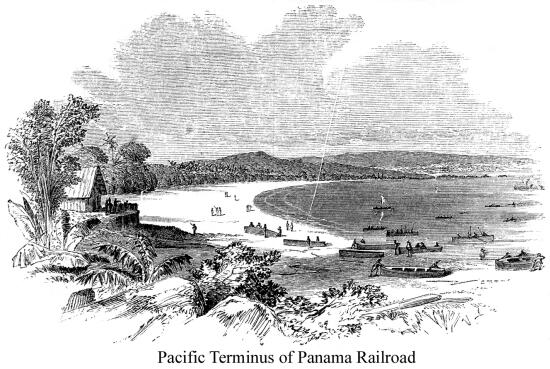 "For seven miles the road passes through
a deep marsh, in which the engineers, during the original survey,
struggled breast-high, day after day, and yet, in spite of such
toilsome and perilous labor, fixed their steady eyes straight
forward, went on step by step, and accomplished their purpose.
These seven miles are firm now as a stone pavement. Piles upon
piles have been driven deep down into the spongy soil and the
foundation covered thick with a persistent earth, brought from
Monkey Hill, which overhangs the railroad track two miles from
Aspinwall. "For seven miles the road passes through
a deep marsh, in which the engineers, during the original survey,
struggled breast-high, day after day, and yet, in spite of such
toilsome and perilous labor, fixed their steady eyes straight
forward, went on step by step, and accomplished their purpose.
These seven miles are firm now as a stone pavement. Piles upon
piles have been driven deep down into the spongy soil and the
foundation covered thick with a persistent earth, brought from
Monkey Hill, which overhangs the railroad track two miles from
Aspinwall.
"On we go, dry shod, over the marsh, through the forest,
which shuts out with its great walls of verdure on either side,
the hot sun, and darkens the road with a perpetual shade. The
luxuriance of the vegetation is beyond the powers of description.
Now we pass impenetrable thickets of mangroves, rising out of
deep marshes, and sending from each branch down into the earth,
and from each root into the air, offshoots which gather together
into a matted growth, where the observer seeks in vain to unravel
the mysterious involution of trunk, root, branch, and foliage.
Now we come upon gigantic espaves and coratos, with
girths of thirty feet, and statures of a hundred and thirty feet,
out of a single trunk of which, without a plank or a seam, the
natives build great vessels of twelve tons burden.
"Again we cross a stream, rippling between banks of verdant
growth, where the graceful bamboo waves over the water its feathery
top, and the groves of the vegetable ivory palm, intermingled
with the wild fig-tree, spread their shade, and rustling gently
in the breeze, whisper a slight murmur of solitude in the ear,
and surest a passing dream of repose."
At Gatun, seven miles from Aspinwall, the first halt was made.
We who remained at home read in the papers gorgeous accounts of
the triumphal arch flung over the road, and the irrepressible
burst of enthusiasm which greeted the passing train. Our author's
recollections of the scene hardly come up to the florid description
of the enthusiastic reporter. He remembers having seen one white
man, two negroes, and a Coolie mounted on the top of a clay bank
in front of a ruinous hut, shouting with all their might, and
firing a salute from an old blunderbuss.
Passing Bujio Soldado, where stands a picturesque cottage which
was formerly the favorite residence of the lamented John L. Stephen,
while upon the Isthmus, the train reached Baracoas, where the
road crosses the Chagres river by a bridge 600 feet in length.
It is built of pine, brought from Georgia. Its massive timbers
seemed as though they might endure for ages; but such is the destructive
character of the climate that in a twelvemonth they must be replaced.
To the west looms up the Cierro Gigante, the loftiest summit upon
the Isthmus whence Balboa saw at one glance the bright waters
of the two oceans. Another short stage brought the train to the
spot which had been selected for the site of a monument to Stephens,
Aspinwall, and Chauncey, the original projectors of the Panama
Road. The train stopped, and two sturdy negroes panted up the
gentle acclivity, bearing the corner-stone of the proposed monument,
and our Minister to Granada delivered a speech, of which copies
were duly forwarded to the papers at home; where we hope it was
read with more attention than seems to have been accorded to it
by hungry listeners.
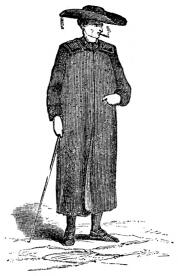 Another seven miles brought the train to the
summit of the line, 250 feet above the level of` the Pacific.
Here has been the heaviest work upon the line. A "deep cutting,"
1200 feet long, and 24 feet deep, has been dug through a soft
soil, which every rain washes down upon the road, requiring a
numerous force of laborer to keep the track clear. A rapid descent
of 70 feet to the mile conquers the descent upon the Pacific side.
Then a few miles of level track and the train reaches Panama,
stopping on the very verge of the shore of the broad Pacific.
The transit from ocean to ocean has occupied, just four and a
half hours, including the time lost in listening to speeches. Another seven miles brought the train to the
summit of the line, 250 feet above the level of` the Pacific.
Here has been the heaviest work upon the line. A "deep cutting,"
1200 feet long, and 24 feet deep, has been dug through a soft
soil, which every rain washes down upon the road, requiring a
numerous force of laborer to keep the track clear. A rapid descent
of 70 feet to the mile conquers the descent upon the Pacific side.
Then a few miles of level track and the train reaches Panama,
stopping on the very verge of the shore of the broad Pacific.
The transit from ocean to ocean has occupied, just four and a
half hours, including the time lost in listening to speeches.
Panama was very quiet just then. The Californians, going and
returning, had all left for their several destinations, and the
visitors had abundance of leisure to wander about the town and
see the few sights, and observe the people. There is the spruce-looking
Padre, in long silk surplice, lined with pink satin. A cocked
hat, fringed and tasseled, covers his reverend head; and his lower
members are encased in silken hose, and polished shoes with golden
buckles. His golden-headed cane, the jaunty air with which be
puffs his cigar, and the gallantry with which he accosts the females
of his flock, show that he is no anchorite. Then came a slouchy
negro woman, with long black hair streaming down her back. Her
garments are anything but superfluous, and, in accordance with
the custom of the Isthmus, the flounces are at the 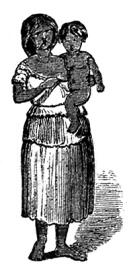 top,
instead of the bottom of the skirt. She carries a child astride
upon her hip, which looks as though it was fashioned for that
special purpose. She, too, is smoking the perpetual cigar. Next
may come a mother and child gayly tricked out in loose calico
dresses, of the most flaming colors and startling patterns. Broad-brimmed,
bright-ribboned Panama hats cover their heads; and satin slippers
are stuck upon the tips of their toes. The child is a perfect
fac-simile of the mother in all but size. From hat to slipper
they are dressed alike. One fancies that he is looking at the
mother through a spy-glass reversed. They evidently belong to
the upper class, and are fully aware of the magnificence of their
appearance, as they pace along in conscious pride through the
streets. Another characteristic denizen of Panama presents himself
in the person of the water-carrier, mounted on his mule. He is
just returning from outside the walls, where be has filled his
kegs from the orange-shaded spring, and is now returning to supply
his customers, whose water-jars stand under the balcony, covered
with cool moisture. Into the bung holes he has inserted a tuft
of green leaves, by way of cork; so that, at first sight, one
might suppose his water-kegs had spontaneously germinated, and
were about to grow up, and perhaps produce a crop of diminutive
vessels in their own image and likeness. A shackled mule is cropping
the grass in the deserted Plaza; a group of naked black children
are playing on the church steps; and a file of galley-slaves are
marching through the streets. Inside the churches, devotees are
prostrate before tawdry images of the saints; and frowzy padres
are snuffing the candles and peering into the contribution boxes.
To remind you of home you look into a drinking saloon, where top,
instead of the bottom of the skirt. She carries a child astride
upon her hip, which looks as though it was fashioned for that
special purpose. She, too, is smoking the perpetual cigar. Next
may come a mother and child gayly tricked out in loose calico
dresses, of the most flaming colors and startling patterns. Broad-brimmed,
bright-ribboned Panama hats cover their heads; and satin slippers
are stuck upon the tips of their toes. The child is a perfect
fac-simile of the mother in all but size. From hat to slipper
they are dressed alike. One fancies that he is looking at the
mother through a spy-glass reversed. They evidently belong to
the upper class, and are fully aware of the magnificence of their
appearance, as they pace along in conscious pride through the
streets. Another characteristic denizen of Panama presents himself
in the person of the water-carrier, mounted on his mule. He is
just returning from outside the walls, where be has filled his
kegs from the orange-shaded spring, and is now returning to supply
his customers, whose water-jars stand under the balcony, covered
with cool moisture. Into the bung holes he has inserted a tuft
of green leaves, by way of cork; so that, at first sight, one
might suppose his water-kegs had spontaneously germinated, and
were about to grow up, and perhaps produce a crop of diminutive
vessels in their own image and likeness. A shackled mule is cropping
the grass in the deserted Plaza; a group of naked black children
are playing on the church steps; and a file of galley-slaves are
marching through the streets. Inside the churches, devotees are
prostrate before tawdry images of the saints; and frowzy padres
are snuffing the candles and peering into the contribution boxes.
To remind you of home you look into a drinking saloon, where 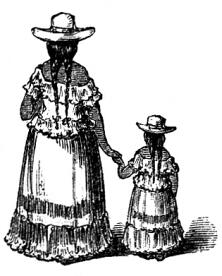 the
sallow bar-keeper is concocting a sherry-cobbler for a fever-stricken
Yankee; a brace of dark-haired natives are making wonderful strokes
at the billiard table; and a group of Spaniards and Frenchmen
are playing dominoes and sipping absinthe. This appears to be
about the sum-total of life in Panama. the
sallow bar-keeper is concocting a sherry-cobbler for a fever-stricken
Yankee; a brace of dark-haired natives are making wonderful strokes
at the billiard table; and a group of Spaniards and Frenchmen
are playing dominoes and sipping absinthe. This appears to be
about the sum-total of life in Panama.
The rampart speaks of the days when the memory of Morgan was
fresh in men's minds. Its solid foundations, laid two centuries
ago, still breast the long waves of the Pacific. But the wall
is in ruins; the loopholes are rent and jagged; the beautiful
guns lie dismounted. A few barefooted mulatto soldiers, clad in
loose linen jackets and trowsers, with red woolen caps on their
heads, smoke their cigars, and strive to keep up the appearance
of a military post. But it is all a sham. The descendants of the
Castilian conquerors, here as every where else, are a worn-out
and effete race. People and town alike have fallen into decay.
The government is too feeble to exercise the ordinary duties of
police, and has been obliged to give into the hands of foreigners
the duty of preserving order on the Isthmus. The right of punishment,
even to life and death, without appeal, has been granted to the
Railroad Company. What the government is unable to accomplish,
is performed by a guard of forty men, headed by Ran Runnels, famed
as a Texas Ranger, who have cleared the Isthmus of robbers, and
keep the thousands of unruly laborers in awe.
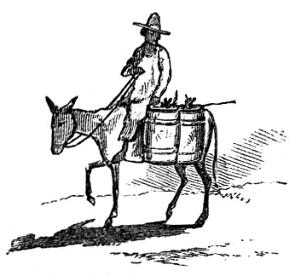 Two centuries ago Panama was the centre of
the trade between Europe and Western America. It was a gorgeous
city, whose merchants were princes. Their warehouses were filled
with gold, silver, spices, and precious stuffs; and their dwellings
were adorned with all that wealth could procure. But the discovery
of the passage round Cape Horn turned the trade into a new channel.
With the decline of the Spanish power the last gleam of prosperity
departed; and since the Isthmus has been divided into feeble states,
the decay has gone on with accelerated speed. For a short time
the California emigration infused a spark of life into the stagnant
city. But it was a spasmodic activity. The two thousand foreigners
who were there congregated in 1850, have fallen to a few hundreds;
and the native population was never fairly aroused from their
deathlike lethargy. The majority of the natives are a mongrel
race, in whose veins White, Indian, and Negro blood is mingled
in every conceivable proportion. Yet these are every way superior
to the few who boast an unmixed Castilian descent. It is fearfully
probable that no race of whites can escape deterioration upon
the Isthmus. The indomitable energy which braves every hardship,
and overcomes every visible obstacle, yields to the fatal influence
of the climate; and each generation sinks lower than the one that
preceded it. Yet the prize of the commerce between the East and
the West is too great to be abandoned without a desperate struggle.
It is hardly to be thought of that this narrow Isthmus should
be suffered to add ten thousand miles to the voyage between New
York and San Francisco. Two centuries ago Panama was the centre of
the trade between Europe and Western America. It was a gorgeous
city, whose merchants were princes. Their warehouses were filled
with gold, silver, spices, and precious stuffs; and their dwellings
were adorned with all that wealth could procure. But the discovery
of the passage round Cape Horn turned the trade into a new channel.
With the decline of the Spanish power the last gleam of prosperity
departed; and since the Isthmus has been divided into feeble states,
the decay has gone on with accelerated speed. For a short time
the California emigration infused a spark of life into the stagnant
city. But it was a spasmodic activity. The two thousand foreigners
who were there congregated in 1850, have fallen to a few hundreds;
and the native population was never fairly aroused from their
deathlike lethargy. The majority of the natives are a mongrel
race, in whose veins White, Indian, and Negro blood is mingled
in every conceivable proportion. Yet these are every way superior
to the few who boast an unmixed Castilian descent. It is fearfully
probable that no race of whites can escape deterioration upon
the Isthmus. The indomitable energy which braves every hardship,
and overcomes every visible obstacle, yields to the fatal influence
of the climate; and each generation sinks lower than the one that
preceded it. Yet the prize of the commerce between the East and
the West is too great to be abandoned without a desperate struggle.
It is hardly to be thought of that this narrow Isthmus should
be suffered to add ten thousand miles to the voyage between New
York and San Francisco.
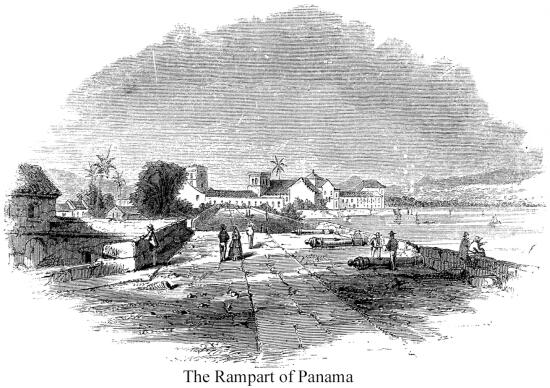 With the commerce between California and the
East for a prize, it would at first sight seem to be no extraordinary
achievement to construct a railway of less than fifty miles in
length, where there were no broad rivers to cross, no rocky ridges
to excavate, and no deep valleys to fill up. But the Panama route
presented obstacles more formidable than these visible and tangible
ones. The materials for the construction and equipment of the
road were all to be brought from a distance. Not only were the
tools and iron work to be conveyed from the United States and
from England, but, although the country abounded in forests, the
very wood upon which the rails were to rest, and of which the
bridges were to be constructed, was the product of Maine and Georgia,
and the food for the laborers must be sought in the markets of
the Atlantic cities. The tropic, climate, which stimulates the
powers of nature, whether of production or destruction, to an
activity unknown in temperate regions, wrought in both directions
with unresting activity against the enterprise. Thick jungles
had to be pierced, which reproduced themselves almost as rapidly
as they were cut down. The way once cleared, if left to itself,
would be overgrown again in a twelvemonth. The destruction of
dead material is as rapid as the growth of the living. A month
does the work of a year. The most solid timber, exposed to the
action of the climate and the insects, decays in a twelvemonth.
Bridges, stations, tanks, houses must be built of stone or iron
to be permanent. With the commerce between California and the
East for a prize, it would at first sight seem to be no extraordinary
achievement to construct a railway of less than fifty miles in
length, where there were no broad rivers to cross, no rocky ridges
to excavate, and no deep valleys to fill up. But the Panama route
presented obstacles more formidable than these visible and tangible
ones. The materials for the construction and equipment of the
road were all to be brought from a distance. Not only were the
tools and iron work to be conveyed from the United States and
from England, but, although the country abounded in forests, the
very wood upon which the rails were to rest, and of which the
bridges were to be constructed, was the product of Maine and Georgia,
and the food for the laborers must be sought in the markets of
the Atlantic cities. The tropic, climate, which stimulates the
powers of nature, whether of production or destruction, to an
activity unknown in temperate regions, wrought in both directions
with unresting activity against the enterprise. Thick jungles
had to be pierced, which reproduced themselves almost as rapidly
as they were cut down. The way once cleared, if left to itself,
would be overgrown again in a twelvemonth. The destruction of
dead material is as rapid as the growth of the living. A month
does the work of a year. The most solid timber, exposed to the
action of the climate and the insects, decays in a twelvemonth.
Bridges, stations, tanks, houses must be built of stone or iron
to be permanent.
But worse than all these is the pestilential climate, with
which no race of men and no strength of constitution can contend;
and against which no measure of precaution and no process of acclimation
is a safeguard. No man could hope to escape the terrible "Panama
fever" for more than a few weeks, or months at most. If the
patient survived the violence of the first attack, the poison
remained in the system, and he could hope for no perfect recovery
so long as he remained on the Isthmus. And those who had apparently
recovered by seeking a more healthy climate, succumbed at once
on their return. "I never met," says our author, speaking
as a medical man, "with a wholesome-looking person among
all those engaged upon the railroad. There was not one whose constitution
had not been sapped by disease."
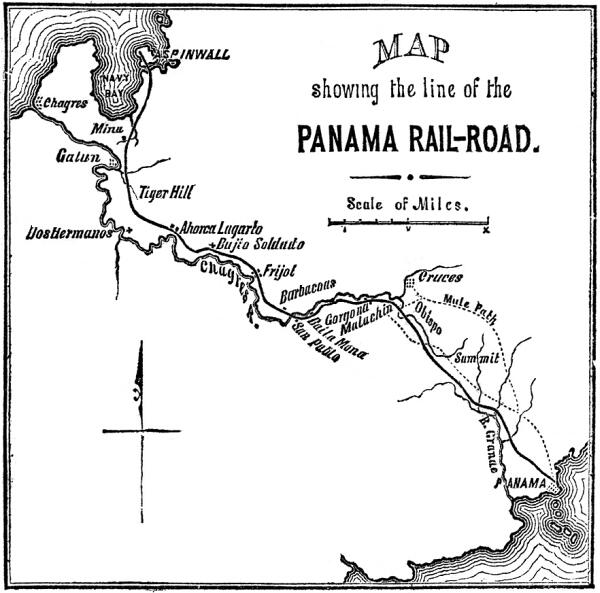
The laborers upon the road were sought from every country,
and there was a marked difference in the rapidity with which different
races yielded to the miasma. The African resisted it longest;
next came the Coolie; then the European races; and last of all
the poor Chinaman, who succumbed at once. A ship-load of eight
hundred of these poor Celestials landed at Panama. Of these thirty-two
were prostrated almost at the moment of landing; in four or five
days eighty more lay by their side; and in as many weeks there
was hardly one who was fit for labor. They gave themselves up
to despair, and sought for death at once, rather than await its
rapid and inevitable approach. Hundreds destroyed themselves.
Some persuaded their companions to kill them. Some seated themselves
on the beach at low-water, and lighting their pipes, grimly waited
for the rising tide to engulf them. Some strangled themselves,
in default of a better means, with their own cherished pig-tails.
Some impaled themselves upon sharpened stakes or the implements
of their labor. In a space of time incredibly short, six hundred
of the eight were dead, and the miserable remnant, hardly alive,
and wholly unfit for labor, were shipped to Jamaica, where they
linger out a life if possible more wretched than that of their
countrymen whom a heartless cupidity brought to our own city,
and then, failing in its object, abandoned here.
Hardly less terrible was the fate of a shipload of Irish laborers,
fresh from their green island. So rapidly did they give way to
the fearful poison pervading the atmosphere, that not one
of them was ever able to perform a full day's labor; and the miserable
survivors, shipped to New York, died almost to a man of the fever
contracted during their brief stay upon the Isthmus.
Nature seemed determined that the "door of the seas"
should not be opened. Yet in spite of the obstacles which she
interposed, and in spite even of the unexpected cost of the work,
the enterprise went steadily on, until in five years from the
time when ground was first broken, the first locomotive traversed
the whole space from ocean to ocean. It is a wonderful triumph
of man's indomitable will over the hostile powers of nature, visible
and invisible. But the victory has been won at a fearful cost
of life and health. Whether—leaving these out of view, and
looking at the matter in a merely pecuniary point of view—the
enterprise is a success or a failure, is still a question. Wall
Street counts up the millions already expended in the construction
of the road, and the other millions required to keep it in operation,
and shaking its head, asks dubiously, "Will it pay?"
We, certainly, most devoutly hope that it may.
Panama Canal
| Contents Page
|







